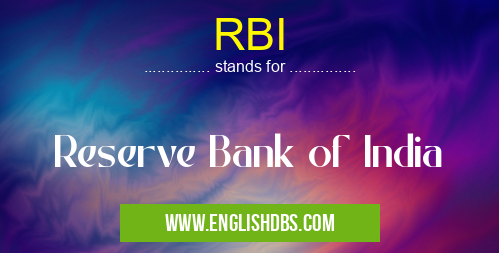What does RBI mean in BANKING
RBI stands for Reserve Bank of India, the central banking institution of India. It was formed in 1935 by the British Government as an entity separate from its government with a mandate to maintain monetary and credit stability in the country. The RBI acts as both banker and regulator to the Indian financial system. It is responsible for currency management, licensing of banks and other financial institutions, supervising payment systems, giving banking advice to the government, issuing public debt securities on behalf of the government and managing foreign exchange reserves. In addition, RBI is responsible for setting monetary policy in India as well as regulating them.

RBI meaning in Banking in Business
RBI mostly used in an acronym Banking in Category Business that means Reserve Bank of India
Shorthand: RBI,
Full Form: Reserve Bank of India
For more information of "Reserve Bank of India", see the section below.
What it means
The RBI's role is central to all economic activity within India’s economy since it controls many aspects related to money including; creating money supply, controlling inflation rates, setting interest rates and protecting customers against fraudulent activities. It also helps shape policies needed for economic growth and reforms by providing guidance on fiscal matters such as taxation or corporate reforms. The RBI helps provide a safe environment where businesses can be conducted without fear of fraud or abuse while companies in India have access to capital markets without worrying about excessive foreign debt. The RBI also serves as an important source of information for investors who are considering investing in Indian markets because it provides detailed data on market sentiment, macroeconomic trends, inflation rates etc., allowing investors to make more informed decisions regarding their investments.
Why is it important
The Reserve Bank of India plays a major role not just within the country but throughout Asia as well due to its iconic status in global banking circles. As one of Asia’s oldest central banks, RBI has become a symbol of trustworthiness due to its long history of delivering sound economic policies that have kept inflation low while ensuring steady growth over decades. Furthermore, it has been instrumental in developing strong capital markets which allow businesses access to local and global investments while at the same time giving investors a reliable platform for capital formation and wealth creation. In recent years RBI’s roles have expanded past traditional areas such as managing liquidity and controlling inflation towards promoting financial inclusion by introducing digital payment platforms like UPI or regulating Fintech firms who are eager to provide new technology-centric solutions within the banking sector.
Essential Questions and Answers on Reserve Bank of India in "BUSINESS»BANKING"
What is the Reserve Bank of India?
The Reserve Bank of India (RBI) is the central bank of India, responsible for controlling monetary policy and issuing currency. Established in 1935, it was initially privately owned but now functions as a fully Government-owned institution. The main objectives of the RBI are to maintain price stability, foster economic growth, promote financial stability, and ensure adequate availability of credit to productive sectors.
Who appoints the Governor of RBI?
The Governor of RBI is appointed by the President on recommendation of Central Government in consultation with an Appointments Committee constituted by the Prime Minister.
What is the role of RBI?
The primary role of RBI is to supervise and regulate banks in order to protect depositors from fraud and mismanagement. Additionally, it works proactively towards fostering financial stability by providing assistance to weaker banks while also enabling healthy competition among them. It also serves as lender-of-last resort in times of liquidity crisis.
How does RBI promotes economic growth?
The RBI carries out several measures such as adequate availability of credit to productive sectors including agriculture and small scale industries at reasonable rates; improvement in payment and settlement systems; promotion of exports; regulation and supervision of forex transactions; effective use & management of foreign exchange reserves etc. This helps bring more investments into circulation thus promoting economic growth in the country.
Does the RBI issue currency notes?
Yes, the issuance and circulation coins and currency notes is one amongst many responsibilities delegated to the Reserve Bank. All Indian Rupee coins are minted or issued by Government Mints while all Indian Rupee note are printed only by Currency Note Press located at Nashik (Maharashtra), Bharatiya Note Mudra Nigam Limited’s Presses at Salboni (West Bengal), Mysore (Karnataka) & Dewas (Madhya Pradesh).
How does the RBI carry out its monetary policy? A: The Monetary Policy Department designs policy frameworks for implementing monetary objectives such as inflation control through open market operations, cash reserve requirements etc. Other instruments used include Repo Rates; Reverse Repo Rates; Marginal Standing Facility Rate; Bank Rate etc.[END] Q:What services does RBI provide/ offer?
The Monetary Policy Department designs policy frameworks for implementing monetary objectives such as inflation control through open market operations, cash reserve requirements etc. Other instruments used include Repo Rates; Reverse Repo Rates; Marginal Standing Facility Rate; Bank Rate etc.
Final Words:
In conclusion Reserve Bank of India plays a very important role within Indian economy in terms of both regulation and guidance that allows businesses access crucial financial services while investors enjoy secure investment opportunities through its established systems which inspire confidence and trust even among international partners. With continuous positive developments seen within Indian economy thanks to beneficial policies maintained by RBI over decades it is expected that this trend will continue increasing prosperity throughout world’s second most populous nation while providing valuable insights into modern banking strategies for other countries looking into increasing development.
